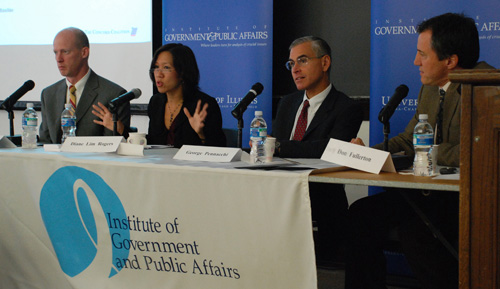Experts weigh in on economy

Left to right, Dr. Robert Carroll, Diane Lim Rodgers, Dr. George Pennacchi, and Don Fullerton prepare to speak at an economic forum Wednesday at Lincoln Hall. Brennan Caughron
October 2, 2008
A crowd of more than 100 University students, community members and economic professionals gathered in Lincoln Hall on Wednesday to hear experts speak about the current status of the American economy.
University finance professor George Pennacchi; Robert Carroll, vice president for economic policy at the Tax Foundation in Washington, D.C.; and Diane Lim Rogers, former chief economist for the House Budget Committee, all focused on the present financial crisis, the effects of our government’s increasing budget deficit and the presidential candidates’ proposed fiscal policies.
Rogers blamed politicians for marginalizing the importance of the budget deficit and thus placing an unfair financial burden on future generations. Postponing revenue increases will make future balancing efforts far more expensive, she added.
Rogers, an Obama supporter who has worked under both the Clinton and Bush administrations, was also critical of the Bush tax cuts and what she called a lack of “spending discipline.”
Carroll explained the differences between Sen. Obama’s and Sen. McCain’s planned tax system changes. Carroll described Obama’s tax plan as one that redistributes the tax burden from low-income taxpayers to high-income taxpayers. Sen. McCain on the other hand, has a tax plan that aims to increase investment and labor productivity by lowering the corporate tax rate.
Get The Daily Illini in your inbox!
Carroll did, however, speak of one notable similarity between the two.
“The candidates have both proposed plans that they cannot afford,” Carroll said. “Both candidates’ plans are out of bounds by anywhere from $3.2 to upwards of $5 trillion over a 10 year period. Even without the financial crisis, they probably will not be able to follow through on everything that they promise.”
For second year MBA student Adri Platt, the most important aspect of the forum was the different values that Obama and McCain are providing.
“I’m already an Obama supporter and that didn’t really change,” Platt said. “But I did really like the point that (Carroll) made in terms of generating (tax) revenue less expensively and that’s definitely something both candidates should consider.”
Pennacchi detailed the history behind our economy’s current financial woes. The existence of so many “toxic securities” in today’s market is partially the cause of the savings and loans crisis of the late 1970s and early 1980s, he said. However, Pennacchi said the regulation of these securities is not the solution.
“I doubt that it’s important that we focus regulation on these types of securities,” Pennacchi said. “Reforms could probably better focus on regulatory tax and monetary policies.”
Following Pennacchi’s analysis of the financial market, Rogers articulated the negative effects of the immense budget deficit and emphasized the importance of fiscal responsibility.
“Americans, for years now, have lived beyond their means, and it’s sort of a day of reckoning for us,” Rogers said. “This is something that is going to affect all of us and catch up with us eventually.”






